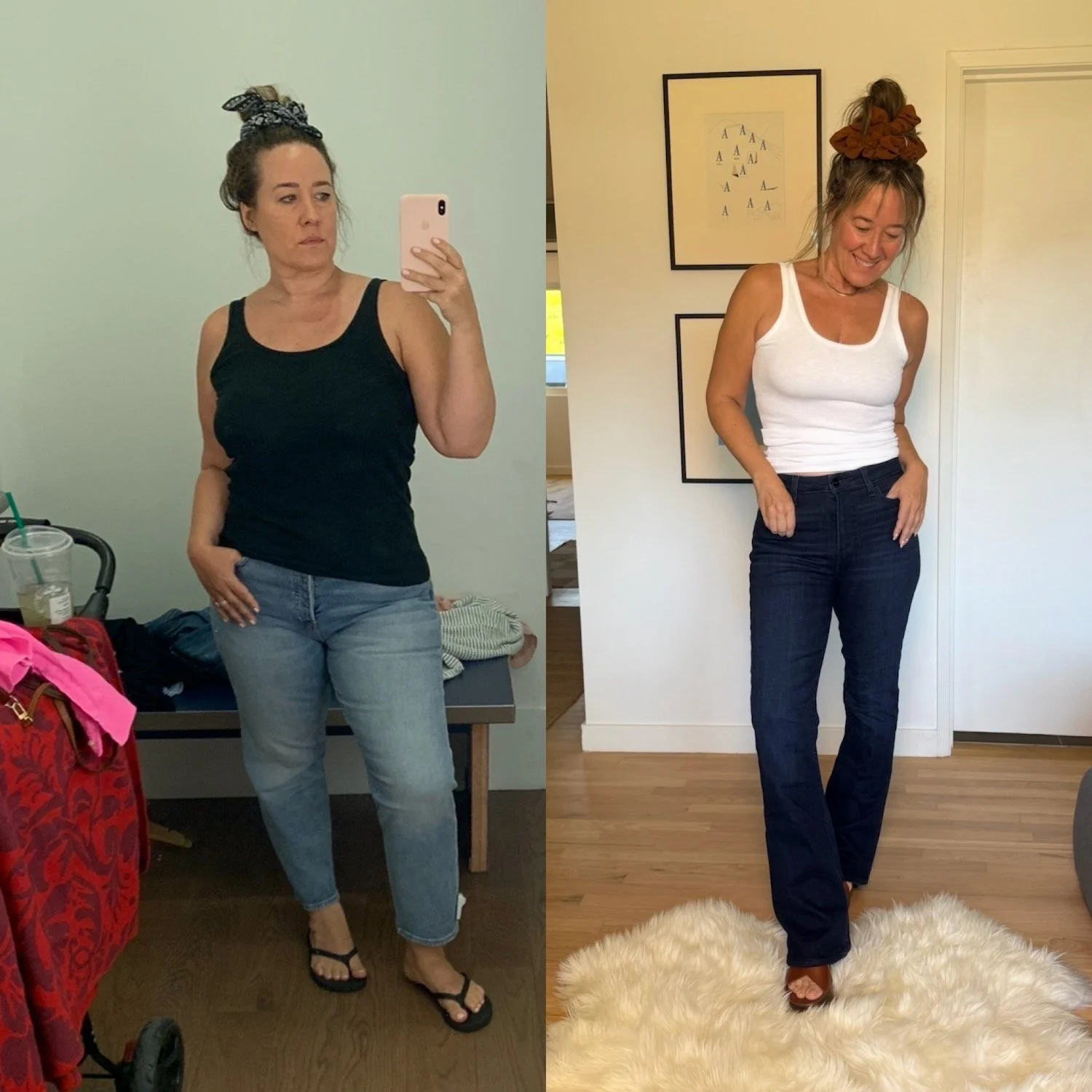Is It Boundaries Or Are You Just Being Hyper-Sensitive?
Before you scream at us … just hear us out.
by The Candidly Team
There’s a good chance you’re already mad at us over this title. Which is fair given that people have enough confusion and guilt about creating boundaries for themselves. So, why make it more difficult?
But this article is in no way a knock on creating healthy boundaries. It’s more of a pathway to explore how to decide what constitutes a “healthy” boundary in the first place.
Because there is so much confusion around this subject, how do we make it an honest, protective principle instead of just a pop psychology term that gets tossed around by TikTok until it loses its meaning? Or its purpose?
We thought it might be a worthy task to explore any steps we can take to make sure our boundaries are serving us. As opposed to say, making us feel more cynical. More sensitive. More afraid. Or, perhaps most importantly, pushing the imperfect people we love away so much that we’re left with no one.
And so, the big question:
How can we be sensitive to our needs without being a jerk to other people?
Over the years, we’ve dove deep into this topic with multiple experts who have offered us insights that completely changed the way we think of boundaries. And today, we share 7 lessons that have helped us cultivate a much more effective relationship to our own boundaries, both in knowing what they are and communicating them to others.
What constitutes a healthy boundary?
Right off the bat, a boundary should not be confused with telling someone else to do something. It’s simply deciding what WE will do in response to a behavior.
For example, this is not boundary:
You can’t talk about calories in front of me.
This is:
I know you’re excited about your own health journey, and I’m thrilled for you. But for me, I won’t be able to text you back if the topic is My Fitness Pal or other calorie counting apps— it’s too difficult for me to engage with.
Boundaries also tend to work a lot better when we’ve communicated our feelings about, not just the boundary itself, but the reasoning behind why we’re setting it. We can then also explain what we will do as a response to something that doesn’t work for us.
“When I talk about boundaries, I’m focusing on recognizing that ultimately only I have agency over my own actions and cannot control others.,” said therapist and author of How to Keep House While Drowning KC Davis. “I define boundaries not as deciding how close you can come, since I cannot control that, but instead as how far am I willing to go.”
7 ways we can establish healthy boundaries:
1. Don't wait until you're fired up to discuss your boundaries with someone else.
Setting a boundary isn’t about having an impulsive emotional reaction. Instead, we should give ourselves the time we need to reflect and understand both what our limits are and what our strategy is to respect them.
Waiting until we’re calm to come up with a plan also helps us formulate what’s really bothering us. For example, were we just overly tired and stressed out in the moment when our spouse asked us to make toast for the kids, or is there a pattern of them not seeing we’re in the middle of 87 things and nonchalantly piling onto our load?
Melissa Urban, author of The Book of Boundaries advises having “discussions outside of the heat of the moment, when the mood is calm and easy.”
“If my parents over-step with parenting my son, I don't bring it up while it's happening, I'll wait until later in the day when the situation is resolved and we're all calm and say, ‘hey, next time he does that and I'm around, please let me handle it.’ It's simple, it's clear, and should they forget next time, I can simply say, ‘Dad, I've got this, thanks,’” said Urban.
2. Focus on what you can control as opposed to policing others.
As we mentioned when defining boundaries, it really isn’t about trying to enforce a certain behavior on someone else, which is never going to be in your control anyway. It’s about deciding on your own action plan.
“Asking your mother not to talk about your weight isn’t a boundary, but a request. That’s not to say that the other person isn’t doing something wrong or harmful by ignoring it -- but my definition of ‘boundaries’ simply places the emphasis on understanding what you can control,” said Davis. “We cannot control if someone honors our requests.”
So, what are some actions we could take in the above example? According to Davis, it could be a range of things, including:
“I call my mom out every time she brings up my weight”
“I do the inner work of not taking on any shame and recognize her comments are her own baggage.”
“I don’t go out to meals with my mom because she comments on my diet.”
“I block my mom from social media so she can’t comment on my pictures.”
“I talk only on the phone to my mom and don’t see her in person.”
“Some of these are internal and some are external. Some are simple and some are extreme. There is no right answer for everyone,” said Davis. But again, the ball is in your court, because you’re choosing a response that’s in your own power.
3. Don't demonize yourself or others by casting things in black or white.
Setting a boundary can feel intimidating or extreme when we make it all or nothing. We don’t have to decide to cut a person out of our lives or never give them a second chance. Instead, we can set a boundary with the intention of making things better between us.
For example, you might say, “we both get really heated when we discuss politics and neither of us has a good time. So for now, I’m not going to engage in those conversations, but I still want to spend time with you.”
It’s crucial to remember when we enforce this kind of respectful boundary, we don’t have to feel guilty, because we’re not doing it to lash out or with the intention of causing harm.
“Boundaries are not selfish, and they're not just about me,” said Urban. “Boundaries are a necessary part of maintaining healthy relationships, so when I set one, it's in the spirit of ‘I want us to be closer/enjoy our time together more/feel safer in each others' space,’ not ‘If you don't give me what I want, I'm going to punish you.’"
4. Recognize that you will always be somewhat vulnerable to getting hurt.
There’s a certain strength and conviction that comes with upholding our own standards for how we want to live and how we’re willing to be treated. However, boundaries are not a form of armor we slip into that no one can ever penetrate. Nor is it our goal to make ourselves an island that doesn’t co-exist with the messy world or the messy people in it
“I think one reason why we become so consumed with boundaries being about others is because we really want to believe that if we could just become good at ‘holding boundaries,’ then we could stop people from hurting us,” said Davis. “And while I do think being a ‘boundaried person’ goes a long way in creating more protection and peace in your own life, there is no way to have boundaries that is going to completely protect you from harmful or inappropriate behavior from others.”
5. Stay flexible and open to things changing.
“When boundaries devolve into a place of rigidity, then they are no longer healthy,” said renowned clinical psychologist Dr. Ramani Durvasula. Sometimes hard and fast rules create limits that don’t factor in a possibility that we or others might change.
Of course, this can be a slippery slope if you’re someone who’s eager to people please or self-defeatingly quick to forgive. But if we make a rash decision that isn’t really appropriate to the situation (the punishment doesn’t meet the crime so to speak), we might narrow our world unnecessarily.
“People misuse boundaries when they create cut off‘s or absolutes,” said Licensed Marriage and Family Therapist Hannah Stensby. “They may say, ‘I’m setting a boundary and I will no longer talk to you,’ or ‘I’m setting a boundary and I will not talk about this issue.’ Boundaries should be used for getting rid of toxic patterns, toxic people, or traumatic situations, rather than getting away from uncomfortable situations.”
6. Don't make it about blame.
Again, the goal is not to unleash on another person or to take on a victimized stance. It’s about being honest and direct about who you are, what you need, and how you’re going to meet those needs from here on in.
“Take responsibility for your boundary setting,” said Durvasula. “Don't tell a person you are setting boundaries because of them, but take ownership of it.”
For example, instead of saying:
You make everything about you. You’re always coming to me with your problems, never asking how I am. You need to grow up and take care of yourself.
You might say:
I’m not feeling like our friendship is equal. I often feel drained and unable to meet all your needs. I want you to feel supported, but I’m not going to be available all the time to take your calls or respond to your texts when you’re not willing to make more of an effort to make it a two-way street.
7. Make talks about your boundaries a respectful, two-way street.
If the goal is to establish trust around our boundaries, the conversation will often have to go both ways. This doesn’t mean we have to agree with everything the other person says or give them 17 hours of our time to tell us why we’re wrong. It just means that when we’re adopting an honest and direct format about our own boundaries, we should at least be willing to hear out theirs. This also helps us make sure we’re not being too staunch or defensive in our position.
“Just as it's your right to impose a boundary around your space and health, it's their right to grant a favor under terms that feel right to them. Are they always fair or reasonable about it? Hell no. But you are only responsible for how you choose to respond,” said Urban.
For example, say your mom babysits your kids several days a week after school but tends to blur your rules around sugary snacks or screentime. If you say something like, “I love when you pick the kids up from school, but I can’t let you do it as often if you’re not willing to cut out some of the junkfood and TV time.”
She might say, “It’s hard for me to stick to your rules once I get tired or the kids get bored.”
You might recognize she’s voicing her own boundary and come up with more of a midway solution like, “How about you only pick them up two days a week or keep them for one hour instead of three, so you have more energy?” Or “what if I prepack all their snacks and activities to support you, because I really appreciate what you offer?”
In every circumstance, boundaries should be consistent and meet us where we’re at, but there’s also always room to keep exploring them to make sure they’re working for us.
Being open-minded in this way doesn’t mean making space for people to walk all over us. It just means deciding where we want to push, challenge, grow, and develop in ourselves, whether that’s by setting a boundary or by trying something outside our comfort zone.
It’s not as fun or decisive as a sassy Instagram quote, but boundaries, like everything else that feeds into our happiness, are all about balance.
This article is for informational purposes only. It is not intended to be used in place of professional advice, medical treatment, or professional care in any way. This article is not intended to be and should not be a substitute for professional care, advice or treatment. Please consult with your physician or healthcare provider before changing any health regimen. This article is not intended to diagnose, treat, or prevent disease of any kind. Read our Terms & Conditions and Privacy Policy.








